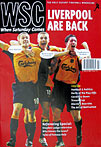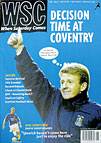 Sol Campbell's departure from Spurs calls into question the level of players' wages
Sol Campbell's departure from Spurs calls into question the level of players' wages
In the last week of May, the golfer Andrew Oldcorn collected more than £300,000 for winning the Volvo PGA tournament at Wentworth. Not a bad return for four days’ work by anyone’s standards, but few in the press were lining up to savage the mild-mannered Oldcorn for his rampant avarice. No matter how he performs on the tour this year, he will not be greeted on the tees of Europe by snarling fans chanting that there is “only one greedy bastard”.
